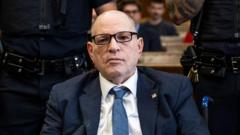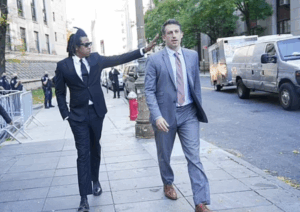Harvey Weinstein's retrial in New York has brought to light alarming allegations of sexual abuse against three women, illustrating the misuse of his Hollywood power. Prosecutors argue that Weinstein's control allowed him to exploit vulnerable individuals, while the defense questions the credibility of the accusers.
Weinstein's Retrial Exposes Dark Secrets of Hollywood Power Dynamics

Weinstein's Retrial Exposes Dark Secrets of Hollywood Power Dynamics
The retrial of Harvey Weinstein unfolds with harrowing testimonies from three women, while the defense counterclaims of fabricated narratives for personal gain.
In a riveting courtroom drama, Harvey Weinstein finds himself retried in New York, where he is accused of exploiting his considerable Hollywood influence to sexually abuse three women. Prosecutor Shannon Lucey opened the case on Wednesday, branding Weinstein a "Hollywood gatekeeper" who wielded "unfettered power" for over three decades. She presented a detailed account of the assaults experienced by a former television production assistant, a budding actress, and a model, emphasizing the multiple instances where "the more they resisted, the more forceful he got."
This marks Weinstein's third trial in five years after his previous conviction was overturned last April. He has pleaded not guilty to the charges. His defense attorney, Arthur Aidala, portrayed the women as individuals seeking fame and financial gain, arguing that their relationships with Weinstein were consensual. Aidala contended that the case would "fall flat," suggesting inconsistencies in the women's testimonies.
The trial's core involves allegations from Jessica Mann and Miriam Haley, both previously part of the 2020 case, alongside new accusations from Polish model Kaja Sokola, who claims Weinstein assaulted her at the age of 16. Lucey narrated the troubling accounts, explaining that many victims endured feelings of shame and pain for years, stifled by Weinstein's success and stature in the film industry.
Weinstein, now 73, is currently serving a 23-year sentence for his initial convictions and has been diagnosed with several health issues, including cancer and diabetes. His legal team has requested that he remain at a Manhattan hospital due to poor conditions at Rikers Island, where he had been previously held.
With more than 100 women accusing him of sexual misconduct, Weinstein’s case resonated deeply with the #MeToo movement, encouraging survivors to come forward with their stories of abuse. During the proceedings, Lucey noted how this movement empowered the three women in their quest for justice.
As the trial unfolds, it serves as a stark reminder of the toxic power dynamics entrenched in Hollywood, revealing not only the personal trauma of the survivors but also the systemic issues that allow such abuses to persist unchecked.





















